Peter MALONE
Saturday, 09 October 2021 13:00
Ruben's Place
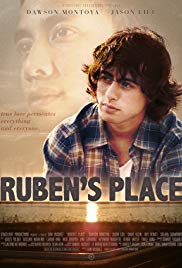
RUBEN’S PLACE
US, 2012, 71 minutes, Colour.
Vint Carmona, David L.Klein, Jason Lieu, Hayward Mc Guffee, Dawson Montoya, Solana Paz, Ray Renati.
Directed by Sam Vasquez.
This is a brief, rather quiet gay-oriented film. Made in 2012, it came at a time when gay audiences said there were insufficient images of themselves in their own stories and own lives on screen.
Ruben has left school, is at home looking after his alcoholic father who then rings his brother to get Ruben a job. He is successful and is promoted by his uncle.
A lot of the action is rather quiet, Ruben at work, at home, with his father, errands which have some criminal background and lead to his uncle’s arrest – but making friends with his uncle’s girlfriend. A friend from school days turns up and Ruben renews acquaintance with him. There had been friendship but now there is the blossoming of love.
There is a subplot about setting up an art centre in the remote town, giving the audience an opportunity to see a wider range of people in the community.
This is a film which may seem slight and inconsequential to mainstream audiences. However, it would be embraced by its target audience.
Published in Movie Reviews
Published in
Movie Reviews
Saturday, 09 October 2021 13:00
Sleepwalker
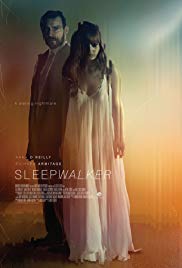
SLEEPWALKER
2017, 86 minutes, Colour.
Arne O'Reilly, Richard Armitage, Isabella School, Rachel Melvin, Kevin Segars, Haley Joel Osmond, Jessica Luo.
Directed by Elliot Lester.
Sleepwalker is something of a psychological case as well as a mindbending film.
We see that the central character, Sarah, sleep walks and there is concern by her roommate. However, the problem with the screenplay is the ambiguity of Sarah, even ambiguity and confusion about her surname.
We see her in various aspects of the narrative but we are not sure what is real, what is the imagined. There is also a scene of the suicide of her husband – and then a range of ambiguities about her relationship with the man and his lover. She is helped by a psychologist then claims not to know her and is treated by doctor who falls in love with her.
What is in her mind? What is happening in reality? What is the truth about Sarah?
1. The title? A psychological case? Thriller? Dreams? Who did the murder?
2. The American city, apartments, streets, hospitals and corridors, the musical score?
3. A psychological case, a mindbending film? What was real, unreal? Sarah and her two names, the identity? A sleepwalking, witnessing the death of her husband, later the husband’s lover? The encounters with the psychologist, her claiming not to know her? Dr Scott White, seeing him at the funeral, confiding in her friend, her accommodation? Meeting the doctor at the University Centre, his caring for her, the relationship, the continuing mystery?
4. Sarah, at home, with her friend, the discussions, the accommodation? Her bewilderment? Waking up? Or asleep?
5. The doctor, at the funeral, the attraction, his help and concern? The psychologist and the meeting, claiming not to know Sarah?
6. The further complications, the different identities, the alternate Sarah, the alternate Dr White? The staff at the hospital centre? The doctor? The orderly, the attempt to smother Sarah?
7. Sarah in coma? The activity in her brain? The confused memories?
8. Sarah’s story, her relationship with the writer, signing autographs for him, her shooting him, attempting to shoot herself, the complications in her mind, memory, confusion?
Published in Movie Reviews
Published in
Movie Reviews
Saturday, 09 October 2021 13:00
Girl/ 2018
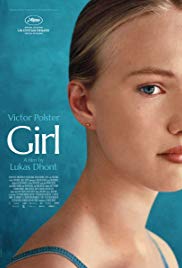
GIRL
Belgium, 2018, 105 minutes, Colour.
Victor Polster, Arieh Worthalter.
Directed by Lukas Dhont.Fedeli
Girl is a contemporary film which takes up the issues of transgender. The setting is Belgian.
This is a story of Lara, a 16-year-old who wants to be a ballet dancer, interviewed for the ballet school, some hesitations on the part of the administration but finally her being accepted. For those who enjoy dancing films and ballet, there are quite a lot of scenes of rehearsals as well as performance.
The issue is that Lara is in a period of transition. She began life as Victor but has made her option, with guidance, with the acceptance of her father who assists her in hospital visits, giving advice, support. She also has a little brother who, at some moments, anxiously becomes confused about his brother/sister.
The school has some difficulties with Lara as a ballerina because of her physiognomy, different muscles, different bodily pressures, especially on the feet. This is frustrating for Lara but she perseveres.
In the meantime, there are many visits to the doctor, discussions about hormones, discussions about treatment, prospects for surgery. But, there is an embarrassing sequence for her when the other ballerinas want to see her private male parts. She reluctantly agrees but this has quite a negative effect on her. The other problem for her is the attraction of a boy who lives down stairs, having to cope then with her sexual orientations and attractions.
Ultimately, Lara becomes more desperate, wanting the surgery urgently – but, in a graphic sequence, castrating herself – and the last image of Lara walking with some sadness down the street.
Lara is played by the androgynous actor, Victor Poster.
1. The title? The introduction to Lara? The introduction to transgender themes?
2. The Belgian settings, homes, schools, the ballet auditorium, changing rooms? The city, streets, buses?
3. The musical score, the background to the drama, the music for the ballet sequences?
4. Lara’s story? Turning 16? A relationship with her father, a six-year-old brother? At home, ordinary life, the bonds between them?
5. Lara, as a boy, wanting to be a girl, want to be a ballerina? The background to the film, the diagnoses, the beginning of procedures, the discussions with the various doctors, physical, psychological, hormone treatment, puberty issues, the preparation for the transformation? The steps, hormones and treatment, weight, time needed? The detailed explanations by the doctor? Audience understanding?
6. Lara, temperament, generally calm, affectionate? Her schools? The interviews for the ballet school? The difficulties with her male background, body balance, toes, movement? Acceptance? Her satisfaction? The other dancers and their awareness? Tolerance? The issue of the changing room? The later seen when the girls demanded to see her masculinity, the effect on Lara?
7. The ballet sequences, used as a metaphor and point of reference? Her success, her practice, the effect on her feet, blood on her toes? Her determination? The manner of the instructors, demands, interactions with Lara?
8. Lara’s father, in himself, his acceptance of Lara’s situation, continued support, visits and interviews, to the doctors? His friendship with Christine? Lara, her becoming more reclusive, not communicating with him, his reaching out to her? The celebration of her birthday, of New Year? A good and sympathetic man?
9. Lara and her younger brother, care for him, his age, his calling her Victor? Upset? Reconciliation?
10. Lara and the boy downstairs, arranging meetings, discussions about affection and relationships? The sexual behaviour? Her reaction?
11. A growing desperation, self-castrating and desperate? Ringing the hospital, the ambulance? Her father and his support?
12. The final image of her walking along the street – her future, audiences speculating about what would happen?
Published in Movie Reviews
Published in
Movie Reviews
Saturday, 09 October 2021 13:00
Joseph Pulitzer, Voice of the People
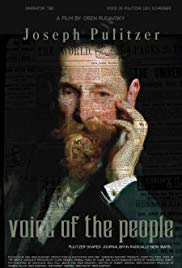
JOSEPH PULITZER: VOICE OF THE PEOPLE
US, 2018, 84 minutes, Colour.
Narrated by Adam Driver. Voices of: Liev Schreiber, Hugh Dancy, Lauren Ambrose, Billy Magnusson, Ryan- James Hatanaka.
Directed by Oren Rudavsky.
While many have heard of the Pulitzer Prizes which are still awarded in a range of areas in the United States, they may not be familiar with the story of Pulitzer himself.
This is a very interesting documentary. It also has some acted sequences, many touches of the docudrama. There is a narration by Adam Driver and a number of well-known actors dubbing the voices of the enacted characters.
Pulitzer was a Jewish refugee from Hungary in the 1860s, arriving in the United States, immediately fighting in the Civil War, then settling in St Louis and becoming involved in collecting stories and, ultimately, newspaper reporting and publication. Moving to New York, he bought further papers, designed a large office building, flourished in his work, his desire for the truth, his intention to cut out dishonesty and corruption.
His main rival at the end of the 19th century was William Randolph Hearst (remembering Citizen Kane), capitalising on American involvement in wars in Cuba and the Philippines – sensationalist reporting, the Yellow Press. For a while Pulitzer was competitive but opted for the opposite of the Yellow Press.
The film shows that he was a strong minded man, workaholic, sadly going blind for the last decade of his life. His family and the next generations were not so much interested in continuing his Empire and, eventually, it was sold. But the significance of his Prizes remains as well as the range of authors, journalists and stories (which are indicated by collage during the final credits).
1. The title, as a journalist, as a voice of the people, his success with newspapers, his career, the aftermath of the Prizes and the courses?
2. The incorporation of photos, newsreel footage? His origins in Hungary, participation in the Civil War, going to St Louis, the jobs, journalistic opportunities, issues, going to New York, the paper, the huge building, the equipment and building and newspaper empire?
3. Docudrama and the staging of scenes, actors’ narrationeddie and voices?
4. Pulitzer in himself, young coming from Hungary, his brother and his coming, also working in papers, touch of rivalry, support? Pulitzer and his opportunities, his participation in the war, so young? Working, the connection with the paper, his articles, eventually buying the paper, building it up, going to New York, the Pulitzer building? An abrasive personality, determined, workaholic?
5. His principles, reporting the news, brief and clear, local content, succinct, with illustrations? Local issues, his stances against corruption?
6. A life of difficulties, leaving St Louis, going to New York, expanding? His marriage – and the formalities? His children?
7. The end of the 19th century, the emergence of William Randolph Hearst, the rivalry, the contrast between the two, their origins, poor versus rich, the status of the United States at the end of the 19th century, Empire, clashes with Spain, Central America, the Philippines, Cuba? The competitiveness and the emergence of the Yellow Press? Pulitzer later changing his mind and being against a Yellow Press?
8. Tragedy towards the end of his life, his going blind, his dependence? Troubles?
9. Working with collaborators, seeing talent, his severity, the distance from his family?
10. Having created an empire – his children not so interested, lingering on, making decisions, selling off interest?
11. But his immortality in his reputation but, especially in the Pulitzer Prizes.
Published in Movie Reviews
Published in
Movie Reviews
Saturday, 09 October 2021 13:00
Other Story, The
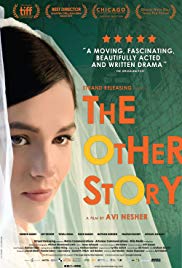
THE OTHER STORY
Israel, 2018, 112 minutes, Colour.
Joy Rieger, Maya Dagan, Sasson Gabai, Yuval Segal, Nathan Goshen, Abigail Harari.
Directed by Avi Nesher.
This is a very interesting film, for the Israeli audience, but for wider audiences outside Israel. It takes the audience into present Israeli communities, the Orthodox as well as the secular – and a visit to an organisation of women who are going back to pagan understandings to assert the role of women and a critique of the religious traditions and, of course, of men.
Director, Avi Nesher, also made the very interesting and arresting Past Life, contemporary stories as well as going back into German and Israeli history.
The central character is a young woman who has led a fairly free and easy life, her parents professionals, a glamorous mother, a psychologist father who has abandoned the family and gone into practice in the United States. She undergoes a conversion experience along with her boyfriend, a musician (and there are videos of their secular days for anyone to see). He still performs but with religious songs and music.
The young woman relates to her grandfather but, with her conversion, she has become alienated and refuses to speak to him. The couple are about to announce their engagement.
Her mother wants to stop the wedding, suspicious of the fiance and trying to find something against him. Her former husband arrives to see his father and has also been drawn into the situation. In the meantime, his own father has invited him to help with the mediation case, a father who wants custody of his son and his intent on educating him well, while the mother, previously feeling put down, has become part of the pagan cult.
There is a scene of the pagan rituals and the psychologist has asked his daughter to assist with the case and attend this ritual.
Which means that the film gives perspectives on quite a range of characters and stances in contemporary Israel, the prosperous secular, troubled ordinary people and their search for deeper meanings, and the studies and prayer at the seminary and the strong religious stances of the Orthodox.
The involvement of the daughter in the case as well as her discovery that her fiance is addicted to pain-relieving drugs means that she has to face a crisis of conscience and integrity.
1. An Israeli story? A contemporary story? Life in Israel and in Tel Aviv? Orthodox Jews, secular Jews, taking Jews? Interconnections?
2. The Israeli city, homes, the seminary for studies, the streets, tourists and tours, shops, celebrations, the visit to the convent and the artwork, the feel of the city? The musical score?
3. The title – and who is other? Each character being the other, with their own story contrasting with others?
4. The situation, the wedding, preparations, rituals of engagement? Anet and the relationship with Shachar, tI just realised I may not heir past, drugs and promiscuity? The reform? The tactics of her mother, to block the wedding? The disapproval of the groom?
5. Anet, in herself, age, her past life, her fiance, the experience for of conversion, devout religiosity? The plans? Her relationship with her mother, the mother dominating, the absent father and her resentment? Need for him? And not talking to her grandfather? Determined, her fiance still performing, but religiously? Her past and the presence of the videos? The background of Jewish Orthodoxy, study, the seminaries? The fiance, his back pain, his drug dependence, the addiction and is buying the drugs?
6. The grandfather, his age, psychologist, Sari and Rami and their case, his trying to mediate? His health and the risks? His son’s arrival, the revelation that he sent for him, for himself, rather than about the wedding? Involving his son in the case? His illness, going to hospital?
7. The mother, glamorous, determined, the resentment of her husband and his leaving? Her expressions of disdain, yet wanting him to be involved? To try to uncover any scandal about the groom? Her going to the celebration and her weeping, her daughter’s reaction? the communication, pretence?
8. The psychologist, coming to see his father, absence from his family, alienation of his wife, the resentment of his daughter? In the US, his success? The scam on the phone call from Diana? His father involving him in the case, meeting the couple, listening to the disputes? Involving his daughter in the case, the interviews, the issue of paganism, feminism, the visits, his experience of the boy? Getting his daughter to go to the cult meeting, the dangers? Rami taking his son, working out that he was at the convent, the sisters and their help, bring him back? Asserting to Sari that he had come with the boy for consultations?
9. Sari and Rami, the marriage, their son, his age, Rami and his tour guide work, knowledge, trying to improve his son? The implicit disdain of his wife’s knowledge? Her anger, wanting custody, becoming involved in the cult, the paganism, goddesses, and not believing it but taking the opportunity to assert herself? The scene with the cult rituals, the women, the children being present? Anet and her presence, bewilderment? Rami abducting his son, taking refuge in the convent with the sisters working on the art which he sold? The police, Anet and the moral dilemma of whether she should not lie on not? The confrontation with Sari? The mutual slapping?
10. The fiance, his addiction being exposed, his being upset, Anet and his telling of the truth? Her being upset, challenged? Her having to admit flaws and failures?
11. The other stories, the wedding, interventions, possible reconciliation and forgiveness?
Published in Movie Reviews
Published in
Movie Reviews
Saturday, 09 October 2021 13:00
Head Count
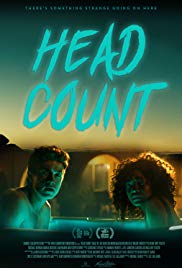
HEAD COUNT
US, 2018, 90 minutes, Colour.
Isaac Jay, Ashleigh Morgan, Bevin Bru, Billy Meade, Hunter Peterson, Chelcie May, Cooper Rowe.
Directed by Ellie Callahan.
This is not a particularly startling film – it is for the characters in the situations but not for the audience watching them.
A young man goes to visit his brother in California, the brother being protective of him. But, the young man decides to go with a group of young people he encounters in the Californian desert around Joshua Tree.
On the one hand, there are the ordinary shenanigans of young adults going together on holidays, drinking, relationships, expeditions into the desert, clashes.
A supernatural element is introduced to the group, a mysterious formula, a mysterious monstrous presence – who seems to be able to infiltrate computers but also take the shape of various members of the group, leading to confusion, drunken mistakes…
At one stage, the proper brother is suspected of causing harm to members of the group, especially a girl who falls down a cliff and who had a relationship with the young brother.
The pace of the film seems rather slow, speeding up towards the end, revelations of the mysterious presence, the mysterious presence being destructive.
And to the brother, sometime vehicle for the mysterious presence, going off with his protective brother at the end.
Very much a take it or leave it kind of horror film.
Published in Movie Reviews
Published in
Movie Reviews
Saturday, 09 October 2021 13:00
Brittany Runs a Marathon
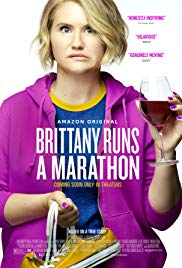
BRITTANY RUNS A MARATHON
US, 2019, 104 minutes, Colour.
Jillian Bell, Utkarsh Ambudkar, Jennifer Dundas, Patch Darragh, Alice Lee, Erica Hernandez, Max Pava, Michaela Watkins, Dan Bittner, Mikey Day, Lil Rel Howery, Kate Arrington.
Directed by Paul Downs Colaizzo.
Here is a serious comedy or, perhaps, a comic serious drama, with 20 somethings as the target audience. Or, perhaps more accurately, late 20 somethings.
Brittany herself, Jillian Bell, is 28 and somehow rather stuck in her life, a job helping in the theatre, another job in cleaning, finding it harder to get out of bed, always late, and putting on weight. She has a roommate who generally looks glamorous but who puts her down. Brittany also tends to put other people down. Is she going anywhere else herself but down?
When she visits the doctor hoping to get a drug prescription, he challenges her to get active. It seems unlikely at first, but she does try, and, since the title itself is something of a spoiler, we know she is going to get active.
One of the troubles, of course, is that Brittany has a very low self-image, memories of her mother abandoning the family, being cared for by her sister and her sister’s kind husband, moving from Philadelphia to New York City, getting an apprenticeship in advertising but her life becoming something of a flop. But, there is an amusing moment when she goes to a gym, listens to the spiel, then asks the price and realises that she can do the same kinds of things out in the fresh air at no cost!
Brittany is set weight loss target and intends to enrolled in the New York Marathon. So, a great deal film focuses on exercise, trying to meet her goals, making friends with some of the people she has looked down on, meeting a somewhat slothful but genial young, Jern (Utkarsh Ambudkar) who cleans with her and they occupy the house of wealthy couple’s house clean and who are away on holidays.
One of the troubles is that Brittany, with her low self-image, can be very mean to people which elicits mean responses in return. This comes to a head when she injures her leg, cannot participate in the marathon, goes home to visit the family and is exceedingly mean to a woman who is something of a mirror-image of herself.
Despite the troubles, and there are more, we know that Brittany is going to recuperate eventually, apologises to the woman she insulted and receives a positive message in return – which means then that the film focuses on hope as it builds up to the marathon itself, Brittany entering, finding it difficult, tempted to pull out, encouraged by all her friends who are watching. And so for characters and audiences alike, a happy ending.
1. The title? The challenge, commitment, completion?
2. The New York settings, apartments, homes, streets, theatre, restaurants, atmosphere? The contrast with Philadelphia, cityscapes, home? Musical score?
3. Jillian Bell as Brittany, her career, age, size? Brittany’s back story, mother leaving, the effect on the father, her sister, Demetrius looking after her?
4. Introduction to Brittany, snoring in bed, late, unreliable, work at the theatre, the reaction of the staff, her cleaning job, sharing her room with Gretchen, Gretchen’s glamour, sharing with Jern, talking with him? Occupying the house? The owners return?
5. The visit to the doctor, the diagnosis, wanting drugs, his advice?
6. The challenge, to exercise or not? Catherine, her studio, Brittany’s dislike and comments? Catherine’s marriage situation, divorce, children? Her calling in to see Brittany, rejected? The range of friends? Exercise, going to the gym, costing too much, diet?
7. The transition, becoming more involved, hard work, running, continuing, persevering? The exercise with friends?
8. Jern, character, his work, in himself, talking, his art, the sexual relationship, casual, his talk about friendship?
9. Brittany and her blocking out anybody who wanted to help her? The offer of the cheque, her blunt refusal? Her self-image?
10. Jern and his help with Internet dating, descriptions of her? The various encounters, talk, sexual advances, backing out?
11. The injury, going to the doctor, the visit to Philadelphia, her drinking, Jasmine and her being mean to her, the speech, Demetrius and his reprimand, Brittany sending flowers, the message – and Jasmine’s sympathetic return note?
12. The range of the other characters, relationships, the clash with Gretchen and being mean to her?
13. One year passing, her work, advertising, with Jern, his proposal?
14. Her running, everybody cheering, stopping, persevering?
15. Her final achievement, the message to anyone in the audience with low self-image?
Published in Movie Reviews
Published in
Movie Reviews
Saturday, 09 October 2021 13:00
Zombieland
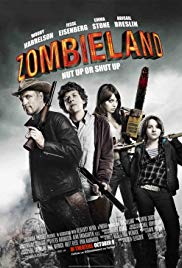
ZOMBIELAND
US, 2009, 88 minutes, Colour.
Woody Harrelson, Jesse Eisenberg, Emma Stone, Abigail Breslin, Bill Murray.
Directed by Ruben Fleischer
At least you know where you stand (or sit) by the title! You are in Zombieland US, where a virus has infiltrated the majority of the population who are now the equivalent of George A Romero's Living Dead, preying on the living and devouring them if they can (though they can run fast, chasing the living, rather than lurch as they do in Romero's films – which, it seems, is why the fat people are the first to be caught and eaten!).
Of course, not everyone wants to see zombie films whether they are serious or funny. This one is funny. There have been some scary movie spoofs but they tend to be a bit along the scratch concert line, hit and miss jokes – and sometimes aiming at the lowest common denominator.
Zombieland is much more cleverly written. It parallels and parodies the living dead conventions but has a lot of wisecracks, especially with movie references, so that there are frequent smiles and laughs.
With the bigger budget than the cheap parodies, the sets are more impressive, especially the climax at a fun park where the cast go on a literal rollercoaster to escape the zombies. And the cast is very good. Jesse Eisenberg gives yet another variation (no, that is too strong a description because he is much the same every time) on his wimpish, dorkish persona which he does so well. He speaks the voiceover narration and his delivery and timing are just right in describing what has happened to the world, how he ticks as a phobia-ridden young man (whose first encounter with a girl finished up with her being a zombie and attacking him) and his list of rules for dealing with zombies.
When he encounters a redneck human (Woody Harrelson at his manic best, shooting zombies but weeping for the loss of his dog - to the accompaniment of Paul Anka singing Puppy Love), there is a standoff but they decide to take the road together. Then they encounter two sisters (Emma Stone and, of all serious young actors, Abigail Breslin) who are not all they seem. It is as if the four of them are in a zombie re-make of I Am Legend.
The foursome, each with a particular eccentricity that makes for humorous interactions, arrive in LA and decide to settle in the mansion belonging to Bill Murray who is at home and gives one of his fine comic performances, sending up Ghostbusters and expressing, when asked, his movie regrets: Garfield!
Given the number of slasher movies, living dead and other horror films, it is good to have one that takes the genres seriously enough to parody them so well. It took them all, writers stars 10 years to do it all again – and very amusingly.
1. The title? Expectations? The popularity of the film? Box office? Critical acclaim? But 10 years before the sequel (and its very close repetition of the plot as well as the comic devices)?
2. The Post-apocalyptic US, mad cow, mad persons, mad zombies? The dismissed stated US? The road trip through the US? The Californian Playland? The musical score?
3. Make up, special effects, vicarious violence in the killing of zombies?
4. The introduction to Columbus, Jesse Eisenberg and his style and manner, University, gawkish, his narrative? Searching for his parents? The encounter with Tallahassee, tough, killing zombies, Woody Harrelson style, the Twinkies’ search, lament for his puppy, discovering that it was his son? Their travelling together, the encounters with the zombies?
5. The discovery of Wichita and Little Rock, the shopping centre, the sisters, con artists, tricking the men, the weapons? Taking the car? The decision to pursue them?
6. Catching the sisters, the adventures across the United States, post-apocalyptic devastation?
7. Hollywood, the visit to Bill Murray, the comic touches, his disguising held himself as a zombie to be able to shuffle around and recognised, his accidental death? The group watching Ghostbusters?
8. Finding Playland, a safety refuge centre, turning on all the rides, the lights, attracting all the zombies?
9. The group bonding, becoming family, the devices for destroying the zombies and keeping safe?
10. The rules – and, courtesy of Wikipedia for those who need to see the rules,
1. "Cardio
2. "Double tap"14 ("Ziploc bags" in a deleted scene
3. "Beware of bathrooms"
4. "Seatbelts"
6. "Cast iron skillet"
7. "Travel light"
8. "Get a kickass partner"
12. "Bounty paper towels"
15. "Bowling ball"
17. "Don't be a hero"; Columbus later changes the rule to "Be a hero" at the amusement park, after facing his greatest fear (a clown-zombie) to save Wichita and Little Rock.
18. "Limber up"
19. "Ziploc bags"
21. "Avoid strip clubs"
22. "When in doubt, know your way out"
28. "Double-knot your shoes"
29. "The buddy system"
31. "Check the back seat"
32. "Enjoy the little things"
33. "Swiss army knife"
34. "Clean socks"
48. "Hygiene"
49. "Always have backup"
Published in Movie Reviews
Published in
Movie Reviews
Saturday, 09 October 2021 13:00
Toman
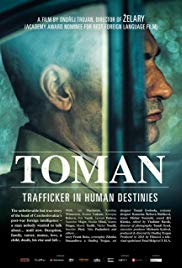
TOMAN
Czech Republic/Slovakia, 2018, 144 minutes, Colour.
Jiri Machacek, Katarina Wintereova, Stanislav Majer.
Directed by Ondrej and Trojan.
This is a film for a specialised audience. It was released in 2018, a collaboration between the Czech Republic and Slovakia, the former Czechoslovakia where the action of this film is set, from 1945 to 1948. It is full of particular detail, names and dates, perhaps even difficult for a Czech/Slovakian audience but demanding for an outside audience.
Nevertheless, this is a significant film for those two countries, a look back at the experience of Nazi occupation, the defeat of the Nazis, the entry of the Soviet troops, the establishing of Czechoslovakia as part of the Soviet Union, the impact of the communists, even those in the government in exile in Britain during the war, but also, the issue of the Jews, and the release of Polish Jews, especially from the concentration camps, their getting a pass through Czechoslovakia in order to go to Germany and to safety in the West, eventually many to Israel.
The central character is the politician, Toman, his significance in Czech politics during the war, his return home and his becoming part of the government, his communist commitment, his Jewish background and the appeal is made to him for safe passage of the Jews. He has sometimes been called the “Czech Schindler� (and at moments during the film the actor, Jiri Machacek, though not as tall, has some facial resemblance to Liam Neeson).
The film opens with a question, the arrest of Toman and his being interrogated for corruption in 1948. The structure of the film is to go back to 1945, the end of the war, his return to his home country, his political involvement (though there are many questions about his being both Communist and Jewish), his becoming part of the government.
It soon emerges that he is a very dubious character. The committed Communist but, with his financial wheeler dealings, sending jewellery to England to raise funds for his particular causes, married and his wife becoming pregnant but his having affairs with his assistants in the office, becoming more and more involved in the machinations of government, the government ministers being seen as more and more corrupt as the years go on (and several executed after a show trial in 1952), he is not an admirable hero.
However, with some doubtful motivations, he does make connections with the Americans, Ambassador, officials, relief workers for Jews in process, and utilises his British connections to make money, often sending his wife to negotiate the deals.
This is quite an expose also of corrupt government, of politicians always trying to get something on the other in order to use it, blackmail, get rid of rivals.
Perhaps one of the morals of the story is that out of bad there can be good and salutary effects. b
Published in Movie Reviews
Published in
Movie Reviews
Saturday, 09 October 2021 13:00
Tell Me Who I Am
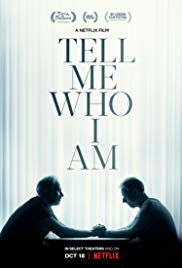
TELL ME WHO I AM
UK, 2019, 85 minutes, Colour.
Alex Lewis, Marcus Lewis, Evan Milton, Luke Mulhern, Thomas Mulhern, Kathleen Ray.
Directed by Ed Perkins.
This is a powerful documentary. Very powerful.
The subjects of the documentary are two brothers, identical twins. One of them, Alex, suffers an accident on a motorbike while young and loses all of his memory except his identification with his brother, Marcus.
Alex has to rely on Marcus for all the information about the family and his growing up, about many practical details of life. Marcus, immediately and over the years, fills in the details of Alex’s life. He tells him stories, he shows him photos, Alex looks at television and sees an idealised family life. Alex is curious and continues to interrogate his brother who continues to give him details of their life..
The film is highly stylised which has raised questions among some audiences about its authenticity, checking medical evidence that someone could lose his complete memory except for his brother, that this situation is something of a fiction, contrived.
In fact, the brothers had written an article which appeared in 2013. The director of this film, Ed Perkins, spent some time with the brothers discussing the project, this sometimes wanting to withdraw from it.
The decision was made by the brothers, filmed when they were 54 and reminiscing about events over a period of 40 years, to go to a stage and stage set, sit at a table and speak to camera. The screenplay and dialogue is so polished that it must have been written and edited. The action is divided into three acts, the first with Alex, the second with Marcus, the third with the two brothers together.
Which means then that the audience He Is Alex’s experience first of all, his explanation of his loss of memory, his dependence on Marcus, is absorbing the story that Marcus told him, the story of an aloof father, a loving mother, idyllic holidays in France, a nice family life.
In the second act, with Marcus speaking, he begins to answer some of Alex’s questions, especially about Marcus’s lack of grief when their mother dies. Marcus is at first reluctant but eventually admits that his whole story was a fabrication. Their mother comes out very badly from Marcus’s story, the tall strong minded woman who exploited her two sons, sexually abused them in her bed, then took them out, singly, to friends and associates for a meal, then leaving them, the friend then abusing the children and she collecting them. This went on for some time. It has had a profound effect on Marcus and he was shielding Alex who had no memory of these experiences.
When Alex confronted Marcus about the reality, Marcus felt that he must keep silent, having created a fantasy story about his own life, not wanting to let the past and its reality come into his life.
Which meant then a tension between the two brothers for decades, their working together, each marrying, each having two children, but the truth and the fictitious story a barrier between them.
Ultimately, Marcus agrees to have a face-to-face sequence with Alex. However, he backs out and lets Alex watch a pre-recorded interview with Marcus about how the estrangement has had an effect on each.
This is enabling for Marcus to be free of some burdens, for Alex to come to terms with his loss of memory, the full story, the true story. They finally embrace – at the age of 54.
Some bloggers are sceptical about the reality of the story and the characters and their interactions. Other bloggers are profoundly moved by this story, shocked by the story of sexual abuse in the family, finding watching the film a staring and challenging experience.
Published in Movie Reviews
Published in
Movie Reviews